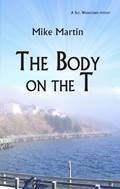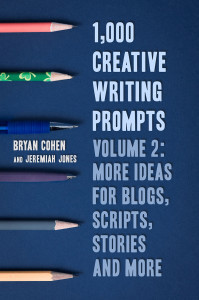Riley Adams's Blog, page 143
December 14, 2013
Twitterific Writing Links
by Elizabeth S. Craig, @elizabethscraig
Twitterific writing links are fed into the Writer’s Knowledge Base search engine(developed by writer and software engineer Mike Fleming) which has over 23,000 free articles on writing related topics. It’s the search engine for writers.
Have a great week!
Tips for creating a fictional town: http://dld.bz/ddJFm @KimWattersAZ
The enduring power of the fairy tale: http://dld.bz/ddJFu @perch15
Write like a housecat: http://dld.bz/ddJFP @peterbrownhoff @writersdigest
Find your tribe, find your voice: http://dld.bz/ddJFT @shewrites @theopnestor
Sit vs. Set: http://dld.bz/ddJFY @writing_tips
Get More Visitors to Your Site With Hashtags: http://dld.bz/ddJFZ @tonyeldridge
What 1 writer has learned in 20 years of writing: http://dld.bz/ddJGb @JTAbooks @womenwriters
4 Fun Ways to Improve Your Facebook Engagement: http://dld.bz/ddJGh @smexaminer
What to do after you blog your book: http://dld.bz/ddJG9 @NinaAmir
Tips for approaching messy 1st drafts: http://dld.bz/ddJGB
Use Seven Senses to Spark Your Writing: http://dld.bz/ddJGE @joanyedwards
Poetic Pauses in Your Writing: http://dld.bz/ddJGG @artsyletters
The Art and Artifact of Creative Nonfiction: http://dld.bz/ddJGQ @NinaAmir
Character Death Should Be Premeditated: http://dld.bz/ddJGT @RogerDColby
Franzen, Elizabeth Gilbert on how they deal with their writerly doubts — and benefit from them: http://dld.bz/dd8C9 @salon @readandbreathe
Sometimes people find symbolism that isn’t intended: http://dld.bz/dd5fJ @KenLevine
The Hero (and Heroine)’s Journey–Hero’s Journey in romance: http://dld.bz/dduW9 @JordanMcCollum
Songwriter’s Intervention: Shedding The Bad Habits That Hold Back Your Songs: http://dld.bz/dduW8 @Jess_B16
The final act of your story: http://dld.bz/dduVg @storyfix
Can You Include Song Lyrics in Your Book? http://dld.bz/dduUG @galleycat
Brand Yourself: How would you sum up your life in just 6 words? http://dld.bz/ddtHs @FirebrandTalent
An agent on 10 keys to becoming a successful writer: http://dld.bz/ddtHA @writersdigest
Writing Encouragement from ‘The Voice’: http://dld.bz/ddMCn @AudraHarders
Women Using a Male Pseudonym: http://dld.bz/ddMCp @womenwriters @RFriedmanAuthor
Blog Post Titles that Don’t Confuse Your Social Media Followers: http://dld.bz/ddMCs @EdieMelson
Description: The Basics: http://dld.bz/ddMCv
5 things that make readers leave websites: http://dld.bz/ddMC2 @BloggingTipsCom @imRahulKuntala
Tips for creating great characters: http://dld.bz/ddMC5 @amazingstories0 @AlienNextDoor
For screenwriters: 5 Questions with a Production Company Reader: http://dld.bz/ddMCB
Hyphens and Dashes: Avoid Confusing Them: http://dld.bz/ddMCK
Psychological Arcs in Groundhog Day: http://dld.bz/ddME9 @cockeyedcaravan
Writing The Spooky Scene: http://dld.bz/ddMED @mooderino
On the importance of banter and character-driven narrative: http://dld.bz/ddMEJ @KameronHurley
41 Flavors of Body Language for Writers: http://dld.bz/ddMEU @susanjmorris
Tools for Writers: Rafflecopter: http://dld.bz/ddMEX @Catrambo
Traits of the Unsuccessful Author: http://dld.bz/ddMEZ @robeagar
Consideration Of Theme In Story: http://dld.bz/ddMFa @mooderino
Faith and Fantasy: http://dld.bz/ddMFe @nkjemisin
Great Character: Linda Ash (“Mighty Aphrodite”): http://dld.bz/ddQ3j @gointothestory
Hoping to Grow Your Audience? Focus on Narratives: http://dld.bz/ddQ3m @danblank
50 tips from Wim Wenders to aspiring filmmakers: http://dld.bz/ddQ3t
Literary breakfasts: http://dld.bz/ddQ3y @guardianbooks
Tips for Writers for Creating Images & Resizing Photos: http://dld.bz/ddQ34 @maggielyons66
How 1 writer pinches from Pixar and Bad Robot to create awesome stories: http://dld.bz/ddQ3Q @guardianbooks
Tips for working with freelance editors: http://dld.bz/ddQ3U @fictorians
Dialogue is Important in Memoirs Too: http://dld.bz/ddQ4a
Bram Stoker Created a Horror Classic from the Anxieties of his Age: http://dld.bz/ddQ4k @tordotcom
Tips for effective social media posts on different platforms: http://dld.bz/ddUpS @wherewriterswin
Timeless Writing Doesn’t Have to Be Super Complicated: http://dld.bz/ddUq6 @Pro_Editor
Literary feuds of 2013: http://dld.bz/ddUqE @newyorker
The 7 Stages You Pass To Become a Writer: http://dld.bz/ddUqY @Ani_LifeProb
Maintain your NaNoWriMo momentum: http://dld.bz/ddUre @AmandaBabs1
On Immediately Trunking Manuscripts: http://dld.bz/ddUrh @ava_jae
9 Words and Phrases to Delete From Your Writing: http://dld.bz/ddUrn @Wiseink
Conflict: the Fuel of your Story: http://dld.bz/ddUr2 @bob_mayer
Holiday gift guide for writers: http://dld.bz/ddUr7 @LauraMarcella
Do You Have “As You Know, Bob…” Syndrome? http://dld.bz/ddUrB @kristenlambtx
3 Easy Steps to Turn Your Writing Insecurities into Strengths: http://dld.bz/ddUrD @LyndaRYoung @AlexJCavanaugh
How Hugh Howey Writes – Great Writers on Writing: http://dld.bz/ddUrH @SeeleyJamesAuth
How to live a great story: http://dld.bz/ddUrW @LipstickGospel
Franzen, Elizabeth Gilbert on how they deal with their writerly doubts — and benefit from them: http://dld.bz/dd8C9 @salon @readandbreathe
What marathon training taught 1 writer about writer: http://dld.bz/ddDMr @monicamclark
Past Tense or Present Tense? http://dld.bz/ddVJK @emma_darwin @womenwriters
Writer Memes: http://dld.bz/ddVJS @sara_flower
Take It Easy With the Thesaurus: http://dld.bz/ddVJZ @epbure
Hugh Howey with a different view of the recent report on what self-pubbed authors earn: http://dld.bz/ddZ4w @hughhowey
7 ways to cut a novel without losing anything important: http://dld.bz/ddZ48 @nailyournovel
How to Write Funny Novels…And Why You Shouldn’t: http://dld.bz/ddZBf @annerallen @melodiecampbell
Narrative Flow and Voice in an Action Thriller Opening : http://bit.ly/1cBK65s @Janice_Hardy
Writing rules learned from Pixar: http://dld.bz/ddZB7
A screenwriter with a tip for writers: http://dld.bz/ddZBS @kenlevine
How to Increase your SEO with Google Plus: http://dld.bz/ddZCn @jeffbullas
Etiquette with Professional Writers: http://dld.bz/ddZCv @passivevoiceblg
Everything You Need to Know About Social Media Branding: http://dld.bz/ddZCB @BloggingTipsCom
Tips for writing character descriptions: http://dld.bz/ddZCR @shalvatzis
The Self-Publishing Debate: A Social Scientist Separates Fact from Fiction: http://dld.bz/ddZCY @digibookworld @DBWeinberg
Top 10 Fantasy Writing Tips From G. R.R. Martin: http://dld.bz/deeBM
What does it mean to be a ‘professional author?’ http://dld.bz/deeCj @dearauthor
Why “Cuckoo’s Calling” Failed: http://dld.bz/ddRB8 @SeeleyJamesAuth
Crime fiction cliches that 1 avid reader would like omitted: http://dld.bz/ddUxe @mkinberg
Do Top 100 Lists Reveal Gender Bias in Publishing? http://dld.bz/ddU6K @Porter_Anderson @caitforestell
Survey on income counts self-pub losers and winners–but only trad-pub winners: http://dld.bz/debW8 @HughHowey @Porter_Anderson @JDGsaid
Challenges of reporting self-pubbed writers’ earnings: http://dld.bz/debWP @hughhowey @Porter_Anderson
The post Twitterific Writing Links appeared first on Elizabeth Spann Craig.
December 12, 2013
Setting the Scene for a Good Story
by Mike Martin
I know you are not supposed to, but I do judge a book, at least whether I am going to buy it or not, based on the picture on the front of the book. That’s not my primary motivation to buy a book, but it can get my attention, attract me, and draw me in. I don’t think I’m alone in that. The front cover gives me an idea of where the book may be set, and sometimes that’s enough to get me to check out the blurb at the back and a little bit about the author.
Everyone has their own personal attractions, but for me and I think a lot of mystery readers we look to the front cover as a way to see inside the book. In my first two books I choose pictures from the area in which the stories take place, small fishing communities on Canada’s east coast.
Here is the cover from Book #1, The Walker on the Cape
As you can see it was a picture of the lighthouse in Grand Bank as seen, not from land, but from the ocean. We added a little fog and rays of sunshine coming through the clouds and the effect is stunning, IMHO. I had a 7 ft. banner done up with this cover on it and used it (still use it) at book signings and other promo events. Many people would come by just to look at the picture and ask where it was taken. Some of them even bought books!! For me the cover set the scene and the scenery made the sale.
But you can’t just put a picture of the ocean on the front and expect that people will rush to look at it and then buy your books. I learned this lesson from Book # 2, The Body on the T
Here is the cover from The Body on the T
[image error]
Another great picture, right? This time it is a boardwalk reaching out into the middle of the Atlantic Ocean. But somehow it didn’t attract people to come over and talk with me. That was too bad because I had a great story to tell them about when you walk out on this boardwalk in Burin, Newfoundland. It could be sunny when you start but some days the fog rolls in and you feel like you are completely surrounded by fog in the middle of ocean. But, alas, they didn’t come over to hear my tale.
Why? Who knows? A design friend of mine says it’s because the first picture is darker and more mysterious and thereby more attractive to mystery readers. The second book, he felt, was too bright and sunny. Maybe it didn’t set the scene right for the story that I wanted to tell or the story inside the book.
Inside my books, scenery and setting are crucial to the story. I have often joked that the weather is a character all to itself and in an ocean-side setting that is often the case. There’s always a little bit or a lot of wind, and almost always the threat of some form of precipitation. The small communities also have their own personality and character. That has been true ever since Jessie Fletcher showed up in Cabot Cove!!
Certain things can only happen in certain settings, although as fiction writers we do stretch that as far as our reader’s imagination will take us. For my books, the small coastal communities are tightly knit and full of secrets. My job is to pry them loose. I also have a responsibility to portray an authentic voice for both the setting and the communities. The words and actions of my characters are visitors to their world and I have to try and allow both to interact with integrity.
The final thing I would say about setting and scenery is that I try to only use places that I have actually seen or visited. Just for me, I think it would be hard to write about a librarian in the Deep South, although I admire those who do. And I do try and use all my senses to describe the setting, what it looks like, sounds like, smells like, feels like and sometimes even tastes like.
I think my mission as a fiction, mystery writer is to create characters who can fit into a real world. I can manipulate both them and their surroundings a little bit in the cause of a good story. But at The End, I want readers to say that both were believable. The best way for me to do that is to try and describe the scenery and the setting as accurately as possible, from my memory or imagination. And if I do that, I think I’m doing okay.
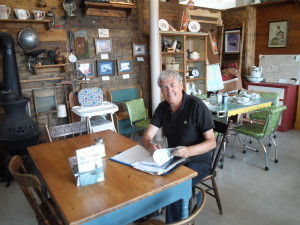 Mike Martin is the author of the Windflower Mystery Series, set in small communities on the east coast of Canada. His latest book, The Body on the T, is now available in print and an e-book on Amazon.com
Mike Martin is the author of the Windflower Mystery Series, set in small communities on the east coast of Canada. His latest book, The Body on the T, is now available in print and an e-book on Amazon.com
The post Setting the Scene for a Good Story appeared first on Elizabeth Spann Craig.
December 10, 2013
Brutal Draft Revisions
by Elizabeth S. Craig, @elizabethscraig
In many ways, my children have been a blessing to me. There are all the big reasons they are…and a smaller one: they’re nothing at all like me. They’re extroverted and involved and fascinated by Big Activities that I avoid.
I wrote poems and stories in my room when I was in middle and high school. They ride horses and scuba dive and rock climb and enjoy parties…and one is now a cheerleader. This means that I’m exposed to all kinds of situations and people that I would ordinarily never experience.
With the cheerleading—wow. It’s quite the culture change for me. In school, I was the one who hung out with the nerdy literary crowd…literary magazine, newspaper. So it was with some level of discomfort that I sat with the other cheerleading moms for the first basketball game that my daughter was cheering at last Thursday. They were certainly not hanging out with the literary nerds in high school. And none of them had apparently brought a spiral notebook to write in before the game started.
These moms have known me for years, though—we’ve always been acquainted with each other and run in the same circles because they all volunteer at the school, like me. We small talked for a bit, but then one mom put me in a death spiral of panic. “Your daughter is so tiny. Did you have to alter her cheer uniform?” she asked.
I stared at her. “Of course—the extra-small swamped her. It would have fallen off.”
“Did you keep the extra cloth?” she asked.
I shook my head. “I’m a non-sewing mom. I took the uniform to an alterations lady.”
She gave me a worried look. “You might not know…but the school has to reuse those uniforms for next year.” The other moms gazed solemnly at me.
Oh gosh, I was already in trouble and we’d just started with cheerleading. I told her I guess I’d pay to replace the uniform…and the very next time I could get hold of my daughter, I turned up the bottom of the cheer top to see that the alterations lady, bless her soul, had merely cinched the material and sewn it together. Phew. The extra material was still there for next basketball season’s, almost certainly larger, cheerleader.
I may have to tip my alterations lady the next time I see her. I’m so relieved she operates the same way I do—because I always keep the cut cloth from my stories, even if I’m positive I’ll never use it.
Altering a story:
I added a subplot to the first draft on Friday—and then promptly hated the subplot. It didn’t seem right for the characters involved.
I made a search (by one of the characters’ names, since that was primarily how the subplot was used) and pulled out all the text. I figured, if I hated it, my editor (who’d asked for a subplot involving the character) would hate it, too.
I put it in a Word file labeled “cut scenes—Savannah.” Just in case.
I wrote out another subplot involving Savannah on a separate Word doc. This time I wanted to plan a more interesting arc for the poor character (who hadn’t been in the last book in the series and editor wanted a proper checking-in on her).
This arc also involved Savannah’s sister and their changing relationship. It intersected with the mystery well, too, and gave an opportunity for Savannah to learn an important clue while she was grappling with her own problems.
Then I wove the subplot into the first draft. This isn’t rocket science—or at least it’s not the way I do it. I’m looking for a point in the narrative where there’s a good spot for an addition—obviously, this wouldn’t be in the middle of an important scene or a bit of dialogue. It’s usually at the end of a scene or the beginning of another one. Now, the place where Savannah discovers a clue is important, a longer scene, and is more important to the plot—it may get its own spot in the middle of two other, important, scenes in the book.
Then I read through to make sure the addition is cohesive and doesn’t repudiate something else I’ve written. I remember one time I did this on another book and was shocked to see that I’d written the character as being out of town in a much-previous draft. Yeah, we have to take stuff like that out. Having the character be out of town visiting an ailing relative and then having the character discover a clue in town isn’t cool.
For this book, my editor wants several subplots for several characters she feels readers especially respond to. I go through this process a few times.
What’s your process for removing and adding scenes and subplots? Do you keep the text you delete from your draft (even if you feel that you’ll never use it?)
Image by mconnors , MorgueFile
The post Brutal Draft Revisions appeared first on Elizabeth Spann Craig.
December 8, 2013
Creating an Ironic Tone in Your Fiction
Guest Post by Jack Smith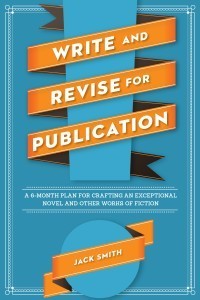
Let’s say you want to create an ironic tone in a story or novel—it’s just needed.
First off, what is tone? On the one hand, we might say that it’s the apparent attitude of the narrator toward the characters and the world they people. But it should also be said that everything in a fictional work relates in some way to the tone. If every character in your story drives crazily and exceeds the speed limit, this will certainly affect the tone. If all the clocks are off twenty minutes, this will too.
To create the right tone, you need to think about character actions, dialogue, and setting. All of these will affect the tone of your story or novel. But you also need to attend to matters of style.
Being something of an iconoclast, I tend to go for irony. An ironic tone is, of course, the right tone for satire—which is my usual medium.
And so when I’m thinking about creating an ironic tone in my work, I find myself—and this tends to happen as I write—depending on the following useful tools:
1. Diction—words that create a witty, humorous tone
2. Irony and Paradox—both deal with contradiction, the first with the gap between what you expect and what you get; the second with apparent contradiction.
3. Juxtaposition – placing two quite different things or details next to each other. One thing is read against the other.
4. Character actions—the kind that are out of kilter with the normal, the expected
5. Plot—the outcome being at odds with the conventionally expected one
6. Dialogue—mine sometimes tends to the extreme—on the one hand, short, clipped speech; on the other, speech that’s excessive, long-winded, over the top.
Of course, it’s not like you can work from a list like this to get it all right. It depends on the story needs. If you want to burlesque your protagonist, you will probably use dramatic irony. If your character is an I-narrator, you will end up, most probably, with an unreliable narrator if you engage in very much dramatic irony—and with an unsympathetic character if your irony is too vicious.
Maybe you want to take a whack at a given social practice. If you settle for a straight, serious tone, you may well come off as preachy. If you use irony, you will be much less likely to do so if you handle the irony well.
How do you handle the irony well? Everything must work together as a piece: the style, the character, the plot, the ideas the work suggests. Every technique in the story must achieve the level of irony that seems called for—without overdoing it.
 Jack Smith is author of the novel Hog to Hog, which won the George Garrett Fiction Prize (Texas Review Press. 2008), and is also the author of Write and Revise for Publication: A 6-Month Plan for Crafting an Exceptional Novel and Other Works of Fiction, published earlier this year by Writer’s Digest
Jack Smith is author of the novel Hog to Hog, which won the George Garrett Fiction Prize (Texas Review Press. 2008), and is also the author of Write and Revise for Publication: A 6-Month Plan for Crafting an Exceptional Novel and Other Works of Fiction, published earlier this year by Writer’s Digest
Over the years, Smith’s short stories have appeared in North American Review, Night Train, Texas Review, and Southern Review, to name a few. He has also written some 20 articles for Novel & Short Story Writer’s Market, as well as a dozen or so pieces for The Writer.
He has published reviews in numerous literary journals, including Ploughshares, Georgia Review, Missouri Review, Prairie Schooner, American Review, Mid-American Review, and the Iowa Review.
Smith taught full-time at North Central Missouri College for some 24 years, and has also served as Fiction Editor for The Green Hills Literary Lantern, an online literary journal published by Truman State University, for over two decades. Learn more about Jack and his work in the November 1 edition of PIF magazine.
The post Creating an Ironic Tone in Your Fiction appeared first on Elizabeth Spann Craig.
December 7, 2013
Twitterific
By Elizabeth S. Craig, @elizabethscraig
Twitterific links are fed into the Writer’s Knowledge Base search engine (developed by writer and software engineer Mike Fleming) which has over 23,000 free articles on writing related topics. It’s the search engine for writers.
Have a great week!
Rethink your writing space–by looking at other rooms in your home: http://dld.bz/ddzjG @bryancohenbooks
4 Reasons to Celebrate Your Writing Milestones: http://dld.bz/ddz6v @LyndaRYoung @AlexJCavanaugh
The Jeff Bezos interview–the story’s big picture was more than drone delivery: http://dld.bz/dd5cS @jeffbercovici @Porter_Anderson @om
Why list posts are always popular: http://dld.bz/ddEwq @Porter_Anderson @mkonnikova
A question to ask yourself when plotting mysteries: http://dld.bz/ddGkz @CamilleLaGuire
5 Lessons Learned from Completing #NaNoWriMo: http://dld.bz/ddtHZ @StacyClaflin
Does everyone really have a novel in them? http://dld.bz/ddtJm @BBCNewsMagazine
Writing Mistakes to Avoid: http://dld.bz/ddtJr @JanuaryMagazine
10 things you might not know about novelists: http://dld.bz/ddtJE @saraleenovel1
12 little-known facts about well-known writers and books: http://dld.bz/ddtJJ @InterestingLit
Snark is a Dead Scene: Why It’s Time For Writers to Try Something New: http://dld.bz/cY5Ua @jaceycockrobin
Getting Book Reviews: The Methods Award-Winning Authors Use: http://dld.bz/cWduA @jimhbs
Ellipses Use: http://dld.bz/cUKm5 @EditorJamieC
How to Work Faster in Microsoft Word With Hidden Features: http://dld.bz/cUGvX @kingbobsley
How To Ask People for Things Via Email: An 8-Step Program: http://dld.bz/dduUD @99u @@jkglei
Script To Screen: “Toy Story”: http://dld.bz/dduUE @gointothestory
Are You In A Complicated Relationship With Your Characters? http://dld.bz/dduUZ @devinberglund
Blake Snyder’s Save the Cat plotting method: http://dld.bz/dduVp @ali_cross @JordanMcCollum
Autobiographical Novels: Instead, Tell a Whopper: http://dld.bz/dduVu @lindasclare
How to write 50,000 words in a month: http://dld.bz/dduVw @colinrobinson28
Age: a Writer’s Ally: http://dld.bz/dduV2 @ocbookblogger @womenwriters
William Shakespeare’s Top 4 Tips of Becoming a Writer: http://dld.bz/dduV4 @samuelkermis
Horror scripts: Are Your First 10 Pages Frighteningly Good? http://dld.bz/dduV8 @scriptmag @dannymanus
Freelancers: How to Get a Publication to Pay You Without Going to Small Claims Court: http://dld.bz/dduVC @10000Words
Do returns diminish on rereading and re-rereading? http://dld.bz/dduVM @guardianbooks
3-act structure in action: http://dld.bz/dduVT @JordanMcCollum
What’s Behind Amazon’s Push to be Everything: http://dld.bz/dduVX @Digiday @slarkpope
Writing and the Creative Life: One key to creativity… naps? http://dld.bz/dduWC @gointothestory
Writing Critiques Versus Criticism: http://dld.bz/ddxdN @JanalynVoigt
After NaNoWriMo: http://dld.bz/ddxed @erchristensen
The case for negative reviews: http://dld.bz/ddxek @Kathy_Gee @washmonthly
What to do now that #NaNoWriMo is done: http://dld.bz/ddxen @rchazzchute
Structured Descriptions: http://dld.bz/dd5dX @NatRusso
Challenges of planning and executing book events: http://dld.bz/dd5eh
3 Tips for Careful Writers: http://dld.bz/dd5ez @writing_tips
Are Hardcover Books on Life Support? http://dld.bz/dd5eH @LynneCantwell
Withdrawal symptoms from unplugging from technology? http://dld.bz/dd5eS @Porter_Anderson @geminiadams @siebergd
What To Do Before Revising A Nano Novel: http://dld.bz/dd5fx @angelaackerman
Why Orwell’s 1984 is a recipe for bad fiction: http://dld.bz/dd5fE @tombarry100
Subtext in dialogue: http://dld.bz/dd5ga @nailyournovel
10 Tips For Creating a Bestselling Series: http://dld.bz/dd5gk @evepaludan
Pen names for different genres? http://dld.bz/dd5gy @goblinwriter
How to Handle Brutal Criticism: http://dld.bz/dd5gJ
Tips for writing your synopsis: http://dld.bz/dd5gU @VictoriaLamb1
Why editing makes 1 writer neurotic: http://dld.bz/dd8BB @GraemeIng
Explaining beat sheets (with examples): http://dld.bz/dd8Dr @johnaugust
4 ways to work through a writing rut: http://dld.bz/dd8D4 @NataliaSylv
Lessons From Writing 750 Words a Day for 365 Days: http://dld.bz/dd8DA @BenNesvig
Tropes and Clichés: http://dld.bz/dd8Eq @writing_ie
What fanfic is and isn’t: http://dld.bz/dd8FT
A man who has written 276 negative Amazon reviews, mostly in verse: http://dld.bz/dd8Gz @DeathAndTaxes
Why Creative Writing Courses Need To Face Up To The Reality of Publishing: http://dld.bz/dd8Hf @TheAngelaClarke
The long route–a manifesto for the late-blooming writer: http://dld.bz/dd8HA @A_WritersStudio
9 reasons to say goodbye to your critique group: http://dld.bz/dd8HY
Why SF Readers Shouldn’t Just Cling to the Golden Age: http://dld.bz/dd8Jj @io9
A Short Late Night History of Writers and the Drink: http://dld.bz/dd8Js @MySportsComplex
How to save books: http://dld.bz/dd8Jy @hughhowey
Great Scene: “Sideways”: http://dld.bz/dd8J8 @gointothestory
Myth and Creativity: Stepping onto Platform 9 3/4: http://dld.bz/dd8JJ @allisonstieger
Grounding Readers in a Quiet Prologue: http://dld.bz/dd8JN @Janice_Hardy
When Spammers and Trolls Take Over – Authors Innovate – Facebook Groups: http://dld.bz/dd8Kg
How to Write in the Zone for a Fast Draft: http://dld.bz/dd8Ks @plotwhisperer
Facing Down the Harsh Realities of Publishing: http://dld.bz/dd8Ky @jamesscottbell
Authors: How to Run a Twitter Competition, & Why it’s a Good Idea: http://dld.bz/dd9Nf @TheAngelaClarke
How to Keep Writing? Take a Break: http://dld.bz/dd9Nk @DebutanteBall
3 Things Authors Overlook When Writing Fiction: http://dld.bz/ddDGU @vgrefer
5 Rules For Conquering Chaos That Every Writer Should Know: http://dld.bz/ddDHg @Claudsy1
Create a playground for your imagination with these 4 attributes: http://dld.bz/ddDHz @onewildword
Inside the Writer’s Brain: http://dld.bz/ddDH4 @Marycgottschalk
5 Gifts for the Writer In Your Life: http://dld.bz/ddDHD @AllenaT
Submitting an Unforgettable Guest Post: Tips from an Editor: http://dld.bz/ddDJx @CordeliaCallsIt
The post Twitterific appeared first on Elizabeth Spann Craig.
December 5, 2013
Approaching Messy First Drafts
By Elizabeth S. Craig, @elizabethscraig
One thing that’s nice about having older children is that they can take over household tasks that we’re either not excited about, or just don’t do well. This is the way it works for me and Christmas decorations.
My daughter put up all the decorations inside the house. They look amazing. My teenage son ordinarily does all the lights on the tree and outside. Unfortunately, since he had four wisdom teeth taken out over Thanksgiving, he was knocked out of the equation. My husband was swamped with work, so I took on the outdoor lights.
When I pulled out the box from last year’s Christmas, I just stared at the jumble on the inside. I’d put away the lights before the New Year last year (some Southerners are superstitious about not putting away Christmas stuff by Jan. 1) and I’d thought I’d done it in an organized way. But looking at the lights (pictured above), I wondered if I might have been on drugs when I put them away. What on earth? Clearly, I’d tried to do something about keeping the wires separated…but tying plastic produce bags around groups of cords? What? And those rubber bands floating around in the mix…they weren’t actually providing any sort of function.
It took a while to straighten them out. And quite a bit of muttering from me. But finally, I spread them out on the front yard, methodically untangling the wires, and then put them on the bushes. They aren’t perfect…but they’re done.
The disastrous jumble reminded me (sadly) of my current first draft. I also wonder as I read it if I were on drugs when I wrote it.  I suppose what I was writing made perfect sense to me the day I penned it. I suppose. But now it resembles just as much of a mess as the lights. I knew from the beginning, though, that this particular first draft was one to be reckoned with.
I suppose what I was writing made perfect sense to me the day I penned it. I suppose. But now it resembles just as much of a mess as the lights. I knew from the beginning, though, that this particular first draft was one to be reckoned with.
My approach-starting out with a time-consuming revision:
Read the manuscript straight through.
As I read it, maintain a second document that lists issues that need to be worked out. Mine are very brief, usually. Here are a couple (shouldn’t be any spoilers, if readers are here): Page 33—Mentioned that Jason had left town 5 years ago. How many years ago was it? What made him return? Page 47—Martha mentions John approached her after the retreat in the parking lot. Did this happen? Did I write this in or only plan on writing it in?
I make minor changes to the document as I read through, but I’m maintain speed because I need a really cohesive assessment of where the problems and continuity issues are—and I won’t get that if this reading through takes too long. Most of my changes have been for improved word choice.
After reading it through and making notes, I’m going to methodically work through the list of issues.
Then I’ll read it through again to make sure it makes sense with the changes.
After that, I’ll layer in my usual late-draft additions of setting, chapter breaks, character description, etc.
More reading through (checking for things like echoes of certain words, other continuity problems, characters who seem out of character, etc.)
How do you approach revising a messy first draft?
December 3, 2013
Listing Our Accomplishments
By Elizabeth S. Craig, @elizabethscraig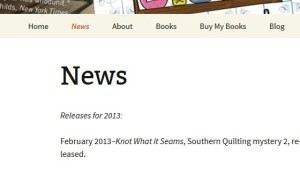
Writer Lynda R. Young wrote a great post for the Insecure Writers Support Group: 4 Reasons to Celebrate Your Writing Milestones. In it, she talks about the benefits of thinking back on past accomplishments.
I love looking back on past achievements. That’s because my to-do list is frequently so scary that it gives me a sense of security to see what I’ve finished. I read once that to-do lists help us be more productive if we keep the crossed-off items on our list instead of making new lists all the time. I can see why—it’s motivating to see how far we’ve come, no matter if the project is writing and promoting a book or cleaning out a garage.
This is particularly important, I think, during this time of year. That’s because it’s resolution time.
I’ve gotten so that I’d rather make to-do lists for my year and plop the tasks on my calendar than come up with a list of resolutions that might be lost or forgotten. Even then, the list seems unmanageable sometimes. I knew, for instance, at this time last year that I’d have at least four books release in 2013 (if I didn’t, I’d be paying back some advance money). I also knew I’d promised readers to put my self-published books in print. In addition, I wanted to explore going into audiobooks. Plus, I knew that my blog—which had issues ever since Blogger had pushed through a major update—needed to migrate to WordPress. It was a lot to do.
But—I crossed all those tasks off my list this year. And instead of relentlessly moving forward to the next item, I slowed it all down a bit. I stuck most of my accomplishments up on my website’s News page. My news page is always a bit sad, anyway, since I don’t really do readings or signings anymore. What’s more, these accomplishments help alert readers that I’ve got print books and audiobooks available for sale now.
Even if you don’t do something as public as a website list, you might want to keep a note somewhere that you can look at when you get overwhelmed by what’s ahead. You could keep it in a Word doc or your calendar, on Evernote or on a sticky note. These could be tasks as big as finishing a first draft, or smaller, important tasks like finding a cover designer or formatter, researching agents, reviewing self-publishing options, or learning social media and how to effectively promote.
Do you track your accomplishments? Celebrate your milestones? What did you accomplish in 2013?
Addendum–I should also mention that I had a book release yesterday! (Not sure where my brain is with promo lately.)
Quilt Trip
, a Penguin NAL book, is now available. 
December 1, 2013
How to Make Your Entire Home an Office
When my wife and I moved into our latest apartment a few years ago, we made sure to get a place with a second bedroom. I planned to use that room as an office for my freelance and personal writing. My success rate for finishing my writing has never been 100 percent in any room anywhere, but that office tops the list efficiency-wise. As important as it is to have a dedicated writing space, I wrote my first few books in a variety of places. Wherever I wrote was my office that day, whether it was the kitchen table or the bedroom. When I feel stuck on my writing in a certain location, I’m happy to move to the next room to see if it can get me past my temporary writer’s block.
Here are a few writing locations you may not have thought of.
1. The Kitchen
I’m fortunate that my kitchen counter comes up to the perfect height for me to stand and write. Whether I’m writing by hand, using my laptop or typing on my Neo 2 electronic keyboard, the act of standing helps to get the blood flowing to my brain. When I pushed myself to the limit with a 2,500 word goal per day (in addition to my 2,000 words or so per day of freelance writing), I would find myself getting too tired or anxious to write. Standing up seemed to help that problem for at least a few hundred words.
2. The Garage
I like to think of my wife’s car like a tiny writing pod. I’ll sit in the backseat, move the front passenger seat as far ahead as it can go and relax into my personal writing area. I don’t turn the car on or anything. I simply sink into the comfortable seat and write. This location was always great for scribbling out a blog post by hand when I simply couldn’t look at a screen any longer that day.
If your garage is off limits because of odor or clutter, this is a good excuse to brainstorm your next book while taking out a few garbage bags worth of junk.
3. The Laundry Room
Our apartment complex has a joint laundry room in the basement of the next building over. I love bringing down a portable work desk with me and hammering out a few hundred words while my laundry tumbles. There’s something about doing two things at once that heightens my sense of accomplishment. “I worked on a book and I finally cleaned those sheets? I’m a rock star!”
I’ve also heard stories of multiple authors who wrote their books in their laundry rooms. Maybe the smell of dryer sheets has something to do with creative productivity.
4. The Bedroom
Now, before you tell me that writing on your bed will put you right to sleep, I have to say that I agree with you. Writing while sitting or lying on your bed is a recipe for disaster if you’re at the beginning of a writing session. If you only have 200 words left as part of your daily goal, however, the comfortable and relaxing accommodations of your bedroom may be able to loosen you up enough to complete them. You know how good ideas always come to you right when you’re about to go to bed? There’s no reason you shouldn’t harness this power during the tail end of your writing sessions. Make sure to set an alarm in case you actually do hit the hay.
5. The Porch
I live in Chicago, which could mean my porch is off-limits about eight freezing months out of the year. At least, it would mean that if I wasn’t crazy. Sometimes, you just need a little oxygen to stir the brain. If that means sitting outside when it’s 20 degrees outside in all of your coats and gloves that are thin enough to let you type, you do it. Maybe not for more than 20 minutes at a time, but it’s a perfectly viable thing to do for a crazy person a.k.a. writer.
I fully recommend a thermal top and bottom if you plan to brave the cold and your writing at the same time.
–
A daily writing routine is one of the keys to becoming a better writer. If you have a hard time meeting your daily goals and you have to stay around the home, you should pull out all the stops to reach those goals. If you feel blocked, test out one of these five primo locations to get you out of your writing funk. You are the renter or owner of your entire home. You might as well use the whole thing to create your next piece of work.
About the Author
 In honor of his new book, Cohen is hosting the “1,000 Prompts, 1,000 Dollars” Writing Contest on his website. Click the link to find out how to enter!
In honor of his new book, Cohen is hosting the “1,000 Prompts, 1,000 Dollars” Writing Contest on his website. Click the link to find out how to enter!
Bryan Cohen is an author, a creativity coach and an actor. His new book, 1,000 Creative Writing Prompts, Volume 2: More Ideas for Blogs, Scripts, Stories and More is now available on Amazon in digital and paperback format. His other books include 1,000 Creative Writing Prompts, The Post-College Guide to Happiness, and Ted Saves the World. He has published over 30 books, which have sold more than 20,000 copies in total. Connect with him on his website, Build Creative Writing Ideas, on Facebook or on Twitter.
November 30, 2013
Twitterific
By Elizabeth S. Craig, @elizabethscraig
Twitterific links are fed into the Writer’s Knowledge Base search engine (developed by writer and software engineer Mike Fleming) which has over 23,000 free articles on writing related topics. It’s the search engine for writers.
Are you an unpublished Crime Novelist? Enter the Emerging Writers Getaway Contest of the Whidbey Writers MFA Alumni Association. Grand prize: $300 and 5-day residency at Northwest Institute of Literary Arts MFA program (tuition and lodging only). Final judge New York Times bestselling author Robert Dugoni. Comments on top three entries by Laurie McLean of Foreword Literary Inc. Submissions open Feb 14-May 23, 2014. Entry fee $25. Proceeds benefit Whidbey MFA Alumni Association programs and scholarship fund. http://www.whidbeymfaalumni.org/?page_id=1154
Kobo exec @mtamblyn on the impossible task of curating 4 million titles & what should scare authors: http://dld.bz/ddsPz
6 Tips for Writing With a Chronic Illness: http://dld.bz/cUFtD @jessbaverstock
A Man Writing Female Characters: http://dld.bz/cUFtE @JonSprunk
All the links I shared last week: http://dld.bz/cUGrJ . All the links I’ve ever shared (searchable): writerskb.com
Top Five Highs and Lows of Publishing: http://dld.bz/cUFtv @mpax1
Thoughts on beginning a novel: http://dld.bz/cUFtq @sharonksouza
5 Tips for Trying to Write When the Kids Are Home: http://dld.bz/cUGsk @WeBlogBetter
15 Common Places That Can Inspire Your Creativity: http://dld.bz/cUGsn @TheWallenWay
10 Mistakes Authors Make That Can Cost Them a Fortune (and how to avoid them): http://dld.bz/cUGsx @bookgal
On Becoming a Professional Amateur: Character Acrobatics: http://dld.bz/cUGsz @bookviewcafe
You Know You’re a Writer If…: http://dld.bz/cUGuS @sara_sans_h
Book cover archive: http://dld.bz/cUGuW @raquelbyrnes
9 Odd Stories Behind Book-Inspired Music: http://dld.bz/cUGve @kimber_regator
Poetry Profiles: Copper Canyon Press: http://dld.bz/cUGvj @nytimesarts
Freelance Editor Rates To Guide Your Work: http://dld.bz/cUGvn @galleycat
The top 3 rules of social media for authors: http://dld.bz/cUGvv @chrisrobley @bookbaby
The Effective Use of Flashbacks: http://dld.bz/cUGv8 @marygkeeley
The Highly Underrated Gravatar – Why You Need One and How to Get It: http://dld.bz/cUGv9 @writerplatform
How to Work Faster in Microsoft Word With Hidden Features: http://dld.bz/cUGvX @kingbobsley
How To Sell Books With Amazon Reviews: http://dld.bz/cUGwk @selfpubreview @cattosko
How To Summon Creative Presence: http://dld.bz/cUFt8 @OrnaRoss
Ellipses Use: http://dld.bz/cUKm5 @EditorJamieC
Tips for surviving revisions: http://dld.bz/cUKnz @AlexJCavanaugh
10 Writers Who Couldn’t Get Published Today: http://dld.bz/cVuXT
7 Time Management Hacks: http://dld.bz/cVuXZ @thebookwright
Adverb abuse: http://dld.bz/cVQMv @EditorJamieC
All about perma-free and ranking at Amazon: http://dld.bz/cVQQ4
Nonfiction writing–find your readers before writing the book: http://dld.bz/cVQQC @GLeeBurgett
Rewarding our readers—freebies for our mailing list: http://dld.bz/cVQQM @ladyanakina
Avoiding social media overwhelm: http://dld.bz/cVQQW @uriel1998
How to Find (and Compile) Proofreading Errors on a Kindle: http://dld.bz/cVQRj @byondpapr
Marketing with promo cards: http://dld.bz/cVQSm @WTDiscover
14 Ways to Tick off a Writer: http://dld.bz/cVQSv @rebeccamakkai @pshares
5 things 1 writer wishes he’d known before going indie: http://dld.bz/cVQSH
How Writers and Bloggers Can Use the Rule of 5 To Become Discoverable: http://dld.bz/cVQSS @ninaamir
Pluck Great Advice from Abundant Information by Experimenting: http://dld.bz/cVQSZ @LeslieLSanders
Should you self-publish or not? http://dld.bz/cVQUj @kristeneperron
Forget the Finish Line, Enjoy the Publishing Process: http://dld.bz/cVTpw @DIYWriting
Sudden immersion as part of a writing process: http://dld.bz/cVYqM @RichardLSutton
A Lesson About Leaving Negative Reviews: http://dld.bz/cWa8q @davastewart
Alternatives to GoodReads: Riffle, LibraryThing & BookLikes: http://dld.bz/cWdmY @CaballoFrances
How To Design and Crowd Test your Kindle Cover: http://dld.bz/cWdu6 @EBindery
Getting Book Reviews: The Methods Award-Winning Authors Use: http://dld.bz/cWduA @jimhbs
Freebie Strategies for Indie Authors: http://dld.bz/cWduU @sabsky
5 Steps to Blogging Mastery for Fiction Writers: http://dld.bz/cRdQ2 @writerplatform
Rafflecopter – An Easy Tool for Author Giveaways and Launch Parties: http://dld.bz/cWdvp @BiblioCrunch
Simple Solutions to 10 Common Writing Roadblocks: http://dld.bz/cQBYn @LeslieLSanders
47+ Places to Submit Your Free KDP Select Promotion for Your Kindle eBook: http://dld.bz/cWdww @trainingauthors
Ebook Marketing: Boxed Sets are Gaining Exposure and Sales: http://dld.bz/cWdw9 @jimhbs
Not About The Money: 10 Other Indie Author Motivations: http://dld.bz/cWdwF @EBindery
Best Unkept Book Marketing Secret of the Indie Author: http://dld.bz/cWdyw @JenniferDiaries
If fragmented is how we read now, then how should we write? http://dld.bz/cWdy6 @byondpapr
Mavens, Reviewers, Readers and Buyers: http://dld.bz/cWdyC @bookbuzzr
Manage Your Author Marketing Platform with 4 Easy Steps: http://dld.bz/cWdyF @CaballoFrances
Cover Art for Self-Publishers: http://dld.bz/cWdyP @LeslieLSanders
Emotional Barriers in Fiction: Intro to Emotional Channels: http://dld.bz/cY5TS @NakedEditor
Snark is a Dead Scene: Why It’s Time For Writers to Try Something New: http://dld.bz/cY5Ua @jaceycockrobin
Focused on Fiction: Five Storytelling Tips: http://dld.bz/cY5V5 @postaday
Are you a writer or an author? http://dld.bz/cY5V7 @ladyanakina
The Myth of Daily Word Count: http://dld.bz/cY5V9 @cerebralgrump
The most powerful marketing for a storyteller are the stories themselves: http://dld.bz/cY5VW @storyrally
Are Travel Writers Obsolete? http://dld.bz/cY5Wh @TravelandEscape
10 Tips to Staying Focused When Writing a Novel: http://dld.bz/cY5Wu
Workspace Porn: The ground they walk on: http://dld.bz/cY5W3 @MFAVN
4 Reasons Authors Should Embrace Their Writing Mistakes: http://dld.bz/cY5W7 @vgrefer
6 Keys for a Writing Retreat: http://dld.bz/cY5Yh @SandraMartini
4 Reasons to Write the Hell Out of (What’s Left of) 2013: http://dld.bz/cY5Ym @pshares @goldenthis
9 Ways Writers Can Use Pinterest: http://dld.bz/cY5Yq @pronounced_ing
Why the Writing of Breaking Bad is So Good: http://dld.bz/cY6bJ @GreenLensMedia
Why Writers Should Practice Short Fiction: http://dld.bz/cY6kN @TheIndieChicks
Are There Books Too Private to Publish? http://dld.bz/cY6kU @bookriot
3 Things You Should NOT Do with Your NaNoWriMo Novel: http://dld.bz/cY6md @changeitupedit
Famous Novelists on Symbolism in Their Work: http://dld.bz/cY6mh @neatorama
Turning the Cogs: Content Farming: http://dld.bz/cY6mt @WritersEdit
15 good reasons why we shouldn’t write for a living: http://dld.bz/cY6mz @colin_falconer
Make your blurbs count: http://dld.bz/cY6m4 @GiveMeYourTeeth
Why 1 writer is grateful that her novels failed: http://dld.bz/cY6mE @NinaBadzin
Yes, being a good writer still matters: http://dld.bz/cY6mT @bizjournalism
Tips for a better author bio: http://dld.bz/ddtAq @janefriedman @writerunboxed
Best Practices for Getting Published: http://dld.bz/ddtAr @ajfinnegan
How to choose a writing style: Social validation, creative expression, or both? (Personality test for writers): http://dld.bz/ddtAw
Brand Yourself: How would you sum up your life in just 6 words? http://dld.bz/ddtHs @FirebrandTalent
What one writer learned from carving teeth: http://dld.bz/ddtH4 @KMWeiland
Publishing industry faces serious challenges, but is hardly ‘spiraling down the drain’: http://dld.bz/cVaRc @Porter_Anderson @MikeShatzkin
Great Scene: “Shakespeare In Love”: http://dld.bz/cUPPx @gointothestory
50 Synonyms for Control: http://dld.bz/cUPPt @writing_tips
Why autobiography is cursed by an unreliable narrator: http://dld.bz/cUPPU @guardianbooks
1 writer’s list of writing mistakes: http://dld.bz/cUPRJ
10 great meals in literature: http://dld.bz/cUPRX @TelegraphBooks
Can’t Take a Research Trip? No Problem: http://dld.bz/cUPSz @carrieturansky
4 Ways to Reveal Your Character’s Personal Boogie Man: http://dld.bz/cUPTg @niniehammon
Top 10 Clever Google Search Tricks: http://dld.bz/cUPTH @WhitsonGordon
Basic Instinct: http://dld.bz/cUPTX @bang2write
Track Changes is your friend: http://dld.bz/cUPUc @EditorJamieC
Writing When You’re Tired: http://dld.bz/cUPU5 @jamesscottbell
10 Promotion Pitfalls to Avoid: http://dld.bz/cUPU7
Build Your Own Bestseller: 3 Formulas: http://dld.bz/cUPPN @noreenmalone
8 Rules For Writing in Bed: http://dld.bz/cUPUF @writersdigest
POV Issues in a Romance Opening: http://dld.bz/cUPUA @janice_hardy
November 24, 2013
Keeping a Professional Distance From our Book
By Elizabeth S. Craig, @elizabethscraig

I’ve been thinking a lot lately about
gaining distance from our books. I
really feel that’s vital to both editing them effectively, gaining a critical
perspective of them, and learning from negative feedback.
One way to gain distance from our books
is to write another book. The authors I
know who wrote one book (and were traditionally published), fell into this
“only child syndrome” with their book…they helicopter-parented it and were
genuinely hurt over poor reviews. Hurt
to the point where they were immobilized and couldn’t move forward with writing
again.
Another way to cultivate this distance is
to adopt the most businesslike attitude we can about our books. Because, if
we’re sticking with publishing as a career…it is
a business. I think that’s where writers
got off-track so many times in the past.
We didn’t understand our contracts, we didn’t understand the nature of
the industry, we didn’t understand our responsibility to our book…which is to
promote ourselves as a brand and work on the next story.
As a business, there’s a research and
development angle. Knowing what
resonates with our readers and what they dislike about our books helps us to
improve the stories and secure our readers’ loyalty to a series. I’ve gotten positive and negative feedback on
all my books and keep track of it on very basic spreadsheets. I think studying the reviews/feedback this
way helps us maintain distance from the work…otherwise, reading our reviews can
be extraordinarily painful. But getting
something positive out of a negative review can help make my next book better.
I get emails and Facebook messages from
readers. I read each book’s highlights
on the book’s product page (the text that readers highlight or comment on with
their Kindle device). I sometimes
venture onto Goodreads—although you really do
have to be strong there because reviews can be particularly vicious on that
site.
What readers like helps me, too. They
frequently have suggestions about plot developments they’d like to see happen
in future books. I’d be crazy not to
listen to these, but it does reach a point where I realize only I know what’s
best for my stories. I’m not writing my
own fan fiction, here. But I can see
trends, if many readers are interested in certain plot points. Relationship arcs, story arcs…whatever piques
reader interest the most. And it
frequently does influence my writing.
There definitely seems a shift to me in publishing toward a sort of
crowdsourcing of ideas in writing. Sites
like Wattpad, where authors release
stories chapter by chapter and readers give feedback are influencing this
trend, too.
If you go this route, I’d collect this
information over a period of time and probably not on days where we’ve just had
a rotten writing day or are feeling insecure about our ability. One thing does help—keeping a Word doc with
copy/pasted positive feedback or reviews or emails. This can really help, especially if you’re
dealing with a crop of bad reviews (sometimes they go in cycles).
How do you keep a professional distance
from your book?
And…Happy Thanksgiving to my American
friends. I’m going to take the remainder
of the week off from blogging to celebrate the holiday—and be Doctor Mom to my
teenager who is getting his wisdom teeth out. :) I’ll be back again on Sunday with
Twitterific.


